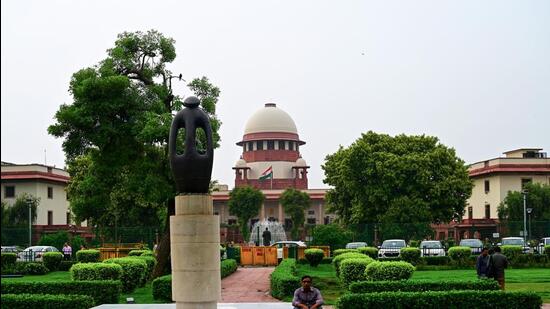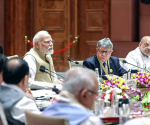Don’t stay bail orders casually: SC to courts

New Delhi The Supreme Court on Thursday condemned the practice of higher courts casually staying bail orders granted by trial courts, particularly when the accused is neither a terrorist nor considered a threat to society.

“What is this happening? A person is granted bail, you (Enforcement Directorate) approached the high court and merely on your asking, the order granting the bail remains stayed for one year. This is shocking,” observed a bench of justices Abhay S Oka and AG Masih.
The apex court underscored that such stays should not be granted merely at the behest of investigating agencies, especially when detailed reasons for granting bail have been provided by the trial courts.
“How can a bail be stayed as a matter of course? Just on the asking of the agency? This is about liberty after all… Where is the question of staying a bail order unless the accused is a terrorist or is a threat to society?” the bench asked ED’s counsel Zoheb Hossain.
The court indicated its intention to deliver a comprehensive judgment that would establish clear guidelines and deterrents against the casual staying of bail orders. “Let’s say something about the casual manner in which an order granting bail was stayed. We will have to say something on this practice by courts. It cannot be like this… What signals we are sending. We are not only blaming you (ED), but we are blaming us as well.”
Notably, the top court’s stance comes against the backdrop of a recent controversy involving Delhi chief minister Arvind Kejriwal, who is in judicial custody in connection with alleged illegalities in the framing of the 2011-22 excise policy.
On June 21, the Delhi high court stayed the bail granted to Kejriwal by a trial court in the money laundering case linked to the excise policy case. The trial court cited a lack of direct evidence against Kejriwal and suggested potential bias in the ED’s approach. Following ED’s appeal, the stay came in less than 24 hours after the order of bail by the trial court, but the high court’s initial stay order by a vacation bench did not provide any reasons, raising significant legal and ethical questions.
On June 23, the CM moved the Supreme Court, assailing the initial stay order. The plea before the top court alleged procedural irregularities in the way the high court handled the case, ruing that an unreasoned order had curtailed his liberty in violation of the basic fundamental threshold on which the bail jurisprudence is premised in the country. Two days later, the high court delivered a detailed order on staying Kejriwal’s bail, prompting the CM’s legal team to withdraw their plea from the Supreme Court with the liberty to file a fresh petition to challenge not only June 21 but also June 25 order of the high court.
In the present case, Parvinder Singh Khurana was granted bail by a Delhi court on June 17, 2023, in connection with a money laundering case. After ED filed an appeal, the Delhi high court on June 23 stayed the bail order but did not give any reason. Khurana moved the Supreme Court against the stay order, prompting a vacation bench to direct on June 7 that Khurana will be released forthwith.
As the matter was taken up by the regular bench on Thursday, Hossain, representing ED, defended the high court’s stay order by pointing out the contradictory nature of the trial court’s orders. He pointed out that 39 days before the impugned bail order, another judge had denied Khurana bail, and without any change in circumstances, bail was later granted. “We have a good case on merits,” Hossain argued, highlighting the alleged involvement of Khurana in a ₹1800 crore fraud.
But the bench was not convinced by Hossain’s defense. “Can you defend such orders as an officer of the court? Why was this matter transferred to another judge? Why did the judges recuse? One judge recused after reserving the judgment. And the bail remained stayed all this while without any reasoned order,” it said.
Hossain responded that high court judges recused from the case, adding the agency cannot be blamed for not courts not penning detailed orders or judges recusing from cases.
The court, however, expressed its discontent with the casual way a detailed bail order was stayed by a one-line order from the high court. “There was a reasoned order for granting bail. Can that be stayed by a one-line order? And then the order of interim stay remains valid for one year. When the accused moves the high court, he is asked to seek temporary bail for urgent reasons,” the court lamented.
The bench went on to reserve its judgment in the matter, allowing ED to file written submissions within two days, and suggesting that it would deliver a comprehensive ruling on the issue.
Later in the day, Hossain returned to court, requesting the bench to allow a law officer to appear and argue in the matter for ED if the court were to lay down certain guidelines on staying bail orders.
“Any judgment laying down guidelines will have huge ramifications. It should not come on me that I did not assist the court properly. There is no affidavit by ED in the matter either. A law officer was supposed to appear in the matter, but he was indisposed today. Please, give us one more opportunity. It’s a mercy plea,” Hossain submitted.
Responding, the court remarked: “This is a case where on the first day, the bail was stayed. The law is clear that in normal cases, such orders cannot be stayed. It can be stayed only in exceptional cases…Look at the shocking state of affairs. We are going to lay down guidelines on the casual manner in which bail orders are stayed.”
In view of Hossain’s repeated requests, the bench eventually agreed to hear a law officer on behalf of ED for 10 minutes on Friday.
The case is particularly relevant for setting a precedent on how bail orders are handled by higher courts. The Supreme Court’s upcoming judgment is expected to address the casual nature of stay orders on bail and outline the responsibilities of investigating agencies and the judiciary in ensuring fair and transparent legal proceedings.















